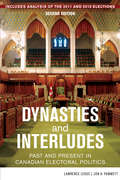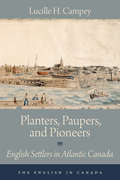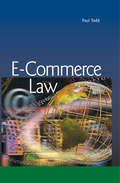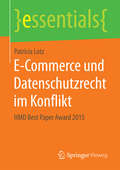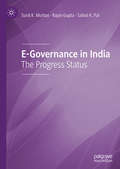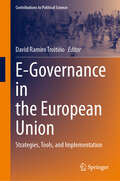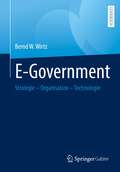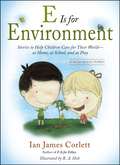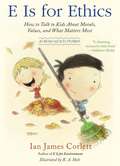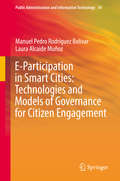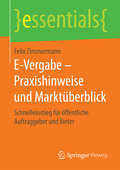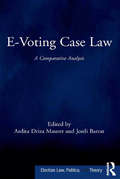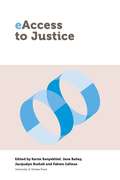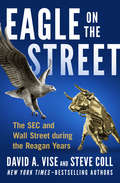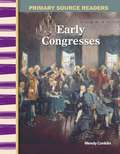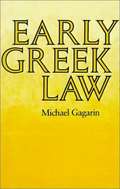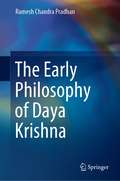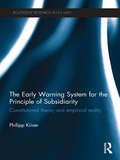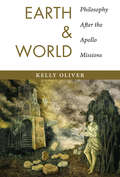- Table View
- List View
Dynasties and Interludes: Past and Present in Canadian Electoral Politics
by Lawrence Leduc Jon H. Pammett André TurcotteThe Hill Times: Best Books of 2016 An overview of the history of elections and voting in Canada, including minority governments, dynasties, and social movements. Dynasties and Interludes provides a comprehensive and unique overview of elections and voting in Canada from Confederation to the most recent election. Its principal argument is that the Canadian political landscape has consisted of long periods of hegemony of a single party and/or leader (dynasties), punctuated by short, sharp disruptions brought about by the sudden rise of new parties, leaders, or social movements (interludes). This revised and updated second edition includes an analysis of the results of the 2011 and 2015 federal elections as well as an in-depth discussion of the “Harper Dynasty.”
Dynasties and Interludes: Past and Present in Canadian Electoral Politics
by André Turcotte Jon H. Pammett Judith I. Mckenzie Lawrence LeducDynasties and Interludes provides a comprehensive and unique overview of elections and voting in Canada from Confederation to the recent spate of minority governments. Its principal argument is that the Canadian political landscape has consisted of long periods of hegemony of a single party and/or leader (dynasties), punctuated by short, sharp disruptions brought about by the sudden rise of new parties, leaders, or social movements (interludes). Changes in the composition of the electorate and in the technology and professionalization of election campaigns are also examined in this book, both to provide a better understanding of key turning points in Canadian history and a deeper interpretation of present-day electoral politics.
E-Commerce Law
by Paul ToddThis book includes detailed coverage of intellectual property, contract, encryption and liability issues, including allocation of domain names, use of metatags and other forms of search engine optimization, digital signatures and the position of ISPs and other intermediaries. There are case studies on electronic conveyancing and e-taxation. Though the book is written from a UK perspective, comparative material is included from other jurisdictions, including America and Singapore in particular.
E-Commerce und Datenschutzrecht im Konflikt: HMD Best Paper Award 2015 (essentials)
by Patricia LotzPatricia Lotz behandelt Rechtsfragen zum Einsatz moderner Marketingformen und gibt einen ersten #65533;berblick #65533;ber die Fallstricke, die sich dem E-Commerce in Zukunft vor allem im Bereich des Datenschutzes stellen werden. Die Autorin zeigt gleichzeitig m#65533;gliche L#65533;sungswege auf. Aus rechtlicher Sicht bespricht sie Webtracking, Geolokalisierung und Social Plugins. Zudem gibt sie eine #65533;bersicht #65533;ber die Integration von E-Payment-L#65533;sungen.
E-FOOD: Closing the Online Enforcement Gap in the EU Platform Economy (Studies in European Economic Law and Regulation #21)
by Maria Jose Plana CasadoRetail is ‘going digital,’ and grocery shopping is no exception. While some businesses are relaying on their corporate website to make the sale, both traditional brick-and-mortar and new disruptive business models are increasingly using online marketplaces to offer their products online. European Union law has been gradually updated to reflect this new reality, with Intellectual Property Rights legislation and Consumer Law leading the way toward a suitable regulatory framework in the Platform Economy. However, the EU has not devised a comprehensive strategy for tackling the challenges posed by the online sale of physical consumer goods, such as effective public enforcement in online environments. In fact, sector-specific legislation, including Food Law, largely ignores online transactions. In this context, the book evaluates the impact that online marketplaces are having on European Union sector-specific legislation and its e-nforcement. The goal is to assess whether the existing regulatory and policy framework are sufficient for promoting compliance and bridging the enforcement gap in the digital single market. Focusing on the e-food market, the book presents a state-of-the-art overview of how online marketplaces are altering EU law and its enforcement by public authorities.
E-Governance in India: The Progress Status
by Sunil K. Muttoo Rajan Gupta Saibal K. PalThe book discusses the concepts of E-Governance from the understanding of a naïve user. While providing introduction to the concept, it shows the status of E-Governance in India through various measures, and its progress through different case studies. The historical development of E-Governance around the world and its rise in few developed and developing nations have also been discussed. The book also elaborates the establishment of E-Governance in India in detail and then compares the progress in Indian states through different measures and metrics. The structure of the E-Governance in India has been explained, including the explanation of the details related to National E-Governance Plan. The book is a combination of theoretical and practical concepts defined over various aspects of E-Governance in India. This book serves as the first stage reading material for any individual working in the Indian region on E-Governance.
E-Governance in the European Union: Strategies, Tools, and Implementation (Contributions to Political Science)
by David Ramiro TroitiñoThis book sheds new light on the future of e-governance in the European Union (EU). Drawing on the first-hand professional experience of practitioners, policymakers, and institutional stakeholders, combined with a sound academic foundation, it offers insights into successful implementation strategies and new tools necessary for efficient e-governance in the European Union. The authors present key topics, e.g. the development of e-services such as e-identity, e-health, e-democracy, as well as e-governance tools for the correct implementation of the Digital Single Market. Furthermore, they discuss the legal framework needed for the implementation of these services, such as data protection, digital competition law, as well as EU contracts in digital environments. Finally, the authors highlight efforts to include ethical standards and European values in the decision-making, while developing a vision for the future use of e-governance in the European Union.Understanding the tools and strategies for a successful implementation of e-governance services, as well as the necessary legal framework, will allow professionals such as policymakers and institutional stakeholders, to improve their performance and achieve better results when working on the development of future e-governance services in the European Union.
E-Government: Strategie – Organisation – Technologie
by Bernd W. WirtzDie Digitalisierung hat einen erheblichen Einfluss auf öffentliche Institutionen und die öffentliche Verwaltung. Dabei hat sich E-Government zu einem wichtigen Wettbewerbsfaktor im internationalen Umfeld entwickelt, der ein wettbewerbsfähiges und umfassendes E-Government-Angebot erfordert. Grundlegende Merkmale der sich digitalisierenden Welt sind ihre zunehmende Dynamik und Komplexität. Während diese Entwicklung zunächst den privaten Sektor erheblich veränderte, ist der öffentliche Sektor zunehmend gefordert, einfach zu bedienende, nützliche und bürgerorientierte E-Government-Lösungen bereitzustellen, die Nutzern komfortablen Datenzugriff sowie Interaktions- und Transaktionsmöglichkeiten bieten. Vor diesem Hintergrund nimmt das Lehrbuch eine am öffentlichen Management und der Verwaltung orientierte Perspektive ein, um das E-Government-Konzept besser zu verstehen und hilfreiche Einblicke sowie strategische Vorgehensweisen für die erfolgreiche Implementierung von E-Government Services zu geben.
E Is for Environment
by Ian James CorlettFrom the author of E IS FOR ETHICS, 26 stories with eco-friendly messages, accompanied by illustrations, discussion questions, and conservation tips.
E Is for Ethics
by R. A. Holt Ian James CorlettHelping kids think about their earth's future is no easy task. These days, there's a lot of talk about being green, buying organic, and protecting our planet, but making eco-friendly choices can be hard for busy families. Luckily, Ian James Corlett--an award-winning children's TV writer and author of E Is for Ethics--is back with a guide that makes saving the environment a fun family adventure. Best of all, Elliott and Lucy--who made values and morals so accessible in E Is for Ethics--are here to help. In these stories, Elliott and Lucy learn that being good to the environment isn't a big chore--it's actually pretty cool! (And they get to teach Mom and Dad a thing or two along the way.) With this engaging read-together book, families will see that the small things they do every day can make a big impact. Teaching your children about the planet has never been so easy or entertaining--and before you know it, they'll be reminding YOU to recycle!
E-Participation in Smart Cities: Technologies and Models of Governance for Citizen Engagement (Public Administration and Information Technology #34)
by Manuel Pedro Rodríguez Bolívar Laura Alcaide MuñozThis book analyzes e-participation in smart cities. In recent decades, information and communication technologies (ICT) have played a key role in the democratic political and governance process by allowing easier interaction between governments and citizens, and the increased ability of citizens to participate in the production chain of public services. E-participation plays and important role in the development of smart cities and smart communities , but it has not yet been extensively studied. This book fills that gap by combining empirical and theoretical research to analyze actual practices of citizen involvement in smart cities and build a solid framework for successful e-participation in smart cities. The book is divided into three parts. Part I discusses smart technologies and their role in improving e-participation in smart cities. Part II deals with models of e-participation in smart cities and the organization issues affecting the implementation of e-participation; these chapters analyze the efficiency of governance models in relation to the establishment of smart cities. Part III proposes incentives to motivate increased participation by governments and cititzenry within the smart cities context. Written by an international panel of experts and practitioners, this book will be a convenient source of information on e-participation in smart cities and will be valuable to academics, researchers, policy-makers, public managers, citizens, international organizations and anyone who has a stake in enhancing citizen engagement in smart cities.
E-Vergabe – Praxishinweise und Marktüberblick: Schnelleinstieg für öffentliche Auftraggeber und Bieter (essentials)
by Felix ZimmermannDieses essential bietet einen schnellen Überblick über die praxisrelevanten Aspekte der bis Herbst 2018 einzuführenden elektronischen Vergabe öffentlicher Aufträge. Der Übergang vom Papier zum Digitalen eröffnet Staat und Unternehmen viele Chancen zur Effektivität des Ausschreibungsprozesses und birgt zugleich Risiken. Mit dem entsprechenden rechtlichen, technischen und organisatorischen Know-how lässt sich die E-Vergabe aber gezielt als effizientes Einkaufsinstrument einsetzen. Hierfür setzt dieses essential erste Impulse und sorgt mit einem nahezu vollständigen Marktüberblick über die verfügbaren E-Vergabe-Standardlösungen für ein praxisnahes Verständnis bei Entscheidern.
E-Voting Case Law: A Comparative Analysis (Election Law, Politics, and Theory)
by Jordi Barrat Ardita Driza MaurerE-voting is the use of electronic means in the casting of the vote at political elections or referendums. This book provides an overview of e-voting related case-law worldwide and explains how judicial decisions impact e-voting development. With contributions by renowned experts on thirteen countries, the authors discuss e-voting both from controlled environments, such as voting machines in polling stations, and uncontrolled ones, including internet voting. Each chapter examines a group of country-specific leading judicial decisions on e-voting and their likely impact on its future development. Reference is made to emerging standards on e-voting such as the Recommendation Rec(2004)11 of the Council of Europe, the only international instrument on e-voting regulation, and to other countries' case-law. The work provides a broader, informative and easily accessible perspective on the historical, political and legal aspects of an otherwise very technical subject, and contributes to a better understanding of the significance of case law and its impact in shaping e-voting's future development. The book will be significantly useful to anyone with an interest in e-voting, in particular decision makers and officials, researchers and academia, as well as NGOs and providers of e-voting solutions.
eAccess to Justice (Law, Technology and Media)
by Karim Benyekhlef, Jane Bailey, Jacquelyn Burkell & Fabien GélinasPart I of this work focuses on the ways in which digitization projects can affect fundamental justice principles. It examines claims that technology will improve justice system efficiency and offers a model for evaluating e-justice systems that incorporates a broader range of justice system values. The emphasis is on the complicated relationship between privacy and transparency in making court records and decisions available online. Part II examines the implementation of technologies in the justice system and the challenges it comes with, focusing on four different technologies: online court information systems, e-filing, videoconferencing, and tablets for presentation and review of evidence by jurors. The authors share a measuring enthusiasm for technological advances in the courts, emphasizing that these technologies should be implemented with care to ensure the best possible outcome for access to a fair and effective justice system. Finally, Part III adopts the standpoints of sociology, political theory and legal theory to explore the complex web of values, norms, and practices that support our systems of justice, the reasons for their well-established resistance to change, and the avenues and prospects of eAccess. The chapters in this section provide a unique and valuable framework for thinking with the required sophistication about legal change.
Eagle on the Street: The SEC and Wall Street during the Reagan Years
by David A. Vise Steve CollA &“spellbinding account&” of Wall Street deregulation in the 1980s, based on a Pulitzer Prize–winning Washington Post series (The New York Times Book Review). Described by the New York Times Book Review as &“worthy of being on the same shelf&” as Liar&’s Poker, Greed and Glory on Wall Street, and Barbarians at the Gate, this eye-opening business history explains how Washington and Wall Street cut the deals that led to a decade of greed. For the Securities and Exchange Commission, the 1980s brought sweeping changes. Under the sway of Reaganomics and the leadership of John Shad, the SEC came down hard on insider trading but introduced wide-ranging deregulation to the stock market, which helped to both fuel the legendary bull market and sow the seeds of the 1987 crash. Shad, a former vice-chairman of the brokerage firm EF Hutton & Company and the first Wall Street executive to lead the SEC since Joseph Kennedy, was a true believer in the free market. His tenure touched all the big headlines and enduring images of this tumultuous decade, from leveraged buyouts to junk bonds, Manhattan skyscrapers to Senate hearing rooms, Michael Milken to T. Boone Pickens. David A. Vise and Steve Coll won the Pulitzer Prize for the original reporting in the Washington Post that would become Eagle on the Street. In an era when the costs, benefits, and risks of deregulation are under debate once again, their &“engrossing account of the struggle for the soul of the SEC&” is essential reading (The Washington Post).
Early Childhood Special Education (0 to 8 Years): Strategies for Positive Outcomes
by Sharon A. RaverFeaturing the application of evidence-based strategies, ecological and family-based approaches, effective learning, and the use of responsive cultural/linguistic practices, Early Childhood Education (0-8 Years): Strategies for Positive Outcomes, prepares students for all the professional knowledge and skill competencies they need to promote optimal development in infant and toddlers (0-3), preschoolers (3-5), and primary-aged (6-8) children with special needs. Using real-life case studies to illustrate recommended practices, the book clearly presents disability characteristics, assessment practices, and easy-to-implement interventions for inclusive and special education settings, while giving students all the resources they need to master and apply the material. Highlights of This First Edition: Prepares students with ALL the professional knowledge and skill competencies necessary to promote optimal development in children with special needs from birth through 8 years old. Highlights intervention techniques from special education, speech-language pathology, occupational/physical therapy, and the fields of vision and hearing impairments. Uses a real-life case study in each chapter to illustrate recommended practices and strategies. Examines the legal, philosophical, and instructional tenets of the field of Early Childhood Special Education in detail, including IDEA 2004. Features how to use evidence-based practices and strategies that maximize communicative, cognitive/literacy, fine and gross motor, adaptive, and social-emotional development in infants and toddlers, preschoolers, and primary-aged children.
Early Congresses (Social Studies Readers)
by Wendy ConklinThis nonfiction book invites readers to learn about the very first United States Congress and government. Readers will learn about colonists' frustrations with the British and what caused them to create the First and Second Continental Congress, Committees of Correspondence, and the Declaration of Independence. With plenty of colorful images, easy-to-read text, and engaging sidebars, readers will be fascinated from cover to cover as they are introduced to the three branches of U.S. government--executive, legislative, and judicial. A glossary and table of contents are provided for assistance for better understanding the content.
Early Greek Law
by Michael GagarinDrawing on the evidence of anthropology as well as ancient literature and inscriptions, Gagarin examines the emergence of law in Greece from the 8th through the 6th centuries B.C., that is, from the oral culture of Homer and Hesiod to the written enactment of codes of law in most major cities.
Early Ideas on Sovereign Bankruptcy Reorganization: A Survey
by Kenneth Rogoff Jeromin ZettelmeyerA report from the International Monetary Fund.
The Early Philosophy of Daya Krishna
by Ramesh Chandra PradhanThis book deals with the philosophy of Daya Krishna, an Indian philosopher of the twentieth century. It discusses the central issues in Daya Krishna’s early philosophy as a synthesis of the Indian and Western philosophical methods. It presents problems of the past and the present in a holistic frame of creative philosophizing. It provides a glimpse into the issues human beings face in all vital areas of human civilization. It discusses the nature of philosophy and the philosophical method in Daya Krishna’s syncretic philosophy. Issues such as self and freedom and ethics and religion are explored in the chapters. It is of interest to those who are engaged with Indian philosophy and Indian philosophers of the twentieth century and especially to those whose interest lies in understanding the cultural East and its philosophical responses to the cultural West.
The Early Warning System for the Principle of Subsidiarity: Constitutional Theory and Empirical Reality (Routledge Research in EU Law)
by Philipp KiiverThis book offers a comprehensive systematic analysis of the European Union’s Early Warning System (EWS) for subsidiarity, which was introduced by the Treaty of Lisbon. The book includes both a detailed theoretical analysis of the EWS as well as an assessment of how national parliaments have responded to EU legislative proposals under the system. Philipp Kiiver explores whether the EWS could function as a mechanism of legal accountability offering a partial remedy to the European Union’s much-discussed accountability deficit. The Early Warning System for the Principle of Subsidiarity provides an overview of the historical developments of national parliamentary involvement in the EU and also considers the broader implications of the EWS, including its relationship to democracy and legitimacy. The book will be of particular interest to academics and students of EU Law, Constitutional Law and Political Science.
Earnings Management and Corporate Finance: The Importance of Transparent Financial Reporting (Routledge Studies in Accounting)
by Joanna Lizińska Marzena Remlein Leszek CzapiewskiIn today's dynamic landscape of accounting, corporate finance, and business management, earnings management has assumed paramount importance. Transparent and reliable accounting information is crucial for accurate corporate performance forecasting and financial decision-making. This book uniquely discusses practical earnings management methods within the accounting and taxation realms. It is supported by extensive international evidence linking informativeness of financial reports to companies’ financial decisions. Delving into the earnings management process, this book provides profound insights into how profits can be influenced through accounting choices and real business transactions. Real-life case studies will undoubtedly facilitate the understanding of accounting and taxation methods. Additionally, it unravels key elements of corporate finance puzzles related to the transparency of financial reports, including the macroeconomic environment, profit thresholds, cash management, audit quality, financing decisions, and financial health. With broad empirical evidence from various European countries, it multidimensionally explores the important link between the quality of information in financial statements and trade-offs behind financial decisions.The book serves as a valuable reference for international researchers in corporate finance, accounting, and corporate governance. It is also a powerful tool for business practitioners, including owners, lenders, auditors, regulatory and professional bodies, business partners, or other market participants. For those seeking the latest insights on earnings management, those producing or assessing accounting information, and those using financial reports in their research or business practice, this book is a must-read.
The Earth and I
by Arthur FirstenbergAlmost all environmental books treat the environmental crisis as though humans are in charge of nature, rather than part of it. The Earth and I is the first book to put all preconceived notions aside and to ask, naïvely: Who are we really? What is our relationship to the earth? How is it possible that we, out of all the millions of species, have come to destroy our common home? The answers are surprising and have far-reaching implications for those searching for solutions. Part One tells what is happening to the earth&’s systems and how they are being destroyed. It rewrites the two-million-year history of humanity&’s tenure on the earth as if we are part of nature and not separate from it, and describes both the earth and the universe as living systems. It paints a global, coherent picture of the devastation to Earth&’s air, water, forests, and creatures that is not found elsewhere. It reviews assaults on these systems that are not treated adequately, if at all, elsewhere: chemicals; radiation; plastics; detergents; biocides; noise; cars; and guns. Part Two, &“Digging below the Surface,&” asks why, and enters territory not previously explored by environmentalists. It describes the various ways to make a living on the earth—hunting and gathering, shifting agriculture, nomadic herding, settled agriculture, and industrial technology—as choices, not eras—choices coexisting with one another until today. It rewrites economics. It explores the relationship of warfare, slavery, religion, and human sexuality to the environmental crisis. And it is forced to conclude that these aspects of human culture are not only shaped, but created by the technologies we use; that the use of non-human sources of energy interferes with human psychological development; and that the unfulfilled urges within us explode in the violent technologies that are destroying our planet. The solutions, if it is not too late, therefore lie in wise choice, rather than wise use, of our technologies.
Earth and World
by Kelly OliverCritically engaging the work of Immanuel Kant, Hannah Arendt, Martin Heidegger, and Jacques Derrida together with her own observations on contemporary politics, environmental degradation, and the pursuit of a just and sustainable world, Kelly Oliver lays the groundwork for a politics and ethics that embraces otherness without exploiting difference. Rooted firmly in human beings' relationship to the planet and to each other, Oliver shows peace is possible only if we maintain our ties to earth and world.Oliver begins with Immanuel Kant and his vision of politics grounded on earth as a finite surface shared by humans. She then incorporates Hannah Arendt's belief in plural worlds constituted through human relationships; Martin Heidegger's warning that alienation from the Earth endangers not only politics but also the very essence of being human; and Jacques Derrida's meditations on the singular worlds individuals, human and otherwise, create and how they inform the reality we inhabit. Each of these theorists, Oliver argues, resists the easy idealism of world citizenship and globalism, yet they all think about the earth against the globe to advance a grounded ethics. They contribute to a philosophy that avoids globalization's totalizing and homogenizing impulses and instead help build a framework for living within and among the world's rich biodiversity.
Earth and World: Philosophy After the Apollo Missions
by Kelly OliverCritically engaging the work of Immanuel Kant, Hannah Arendt, Martin Heidegger, and Jacques Derrida together with her own observations on contemporary politics, environmental degradation, and the pursuit of a just and sustainable world, Kelly Oliver lays the groundwork for a politics and ethics that embraces otherness without exploiting difference. Rooted firmly in human beings' relationship to the planet and to each other, Oliver shows peace is possible only if we maintain our ties to earth and world.Oliver begins with Immanuel Kant and his vision of politics grounded on earth as a finite surface shared by humans. She then incorporates Hannah Arendt's belief in plural worlds constituted through human relationships; Martin Heidegger's warning that alienation from the Earth endangers not only politics but also the very essence of being human; and Jacques Derrida's meditations on the singular worlds individuals, human and otherwise, create and how they inform the reality we inhabit. Each of these theorists, Oliver argues, resists the easy idealism of world citizenship and globalism, yet they all think about the earth against the globe to advance a grounded ethics. They contribute to a philosophy that avoids globalization's totalizing and homogenizing impulses and instead help build a framework for living within and among the world's rich biodiversity.
